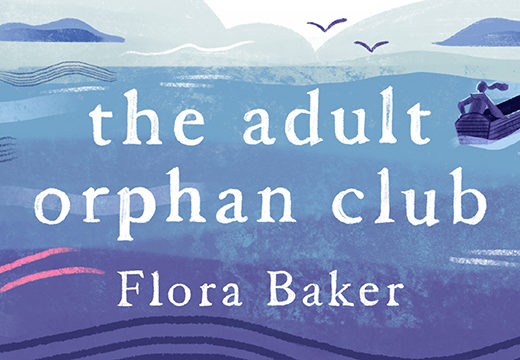I’ve read a lot of grief books over the years.
That’s what happens when you lose your mum to cancer when you’re 20, and your dad to fibrosis when you’re 29. I’ve spent a full decade dealing with grief – and although writing has often been my catharsis, I’ve also found a lot of solace in reading other people’s words.
If you’re new to grieving, it might feel strange to actively seek out the same pain on hundreds of pages. But grief is a collective experience. Every person on the planet will go through it at some point. And one of the biggest lessons I’ve learned about grieving is that we’re honestly not alone in the process, however isolating it might feel.
In fact, it can be a huge help to see your own grief and loss mirrored in that of others; of the hundreds (probably thousands!) of authors who’ve channelled their pain into stories. Sharing what they’ve been through and what they’ve learned about grief becomes a motivation to help others. To help you.
Pin me for later!
At one point in the bestselling memoir When Breath Becomes Air, terminally ill author Paul Kalanithi begins to read all the literature he can find about mortality, “searching for a vocabulary with which to make sense of death, to find a way to begin defining (himself) again.”
I’d say this is just as valid as those of us coping with grief. We’re looking for a grief language; one that sadly we don’t have much access to until we’re already thrown headlong into the process.
So to make that search a little easier, here are some of the best books I’ve found to help me through grief.
- ‘The Year of Magical Thinking’ by Joan Didion
- ‘H is for Hawk’ by Helen Macdonald
- ‘Splitting the Difference’ by Tre Rodriguez Miller
- ‘The Iceberg’ by Marion Coutts
- ‘A Grief Observed’ by C.S. Lewis
- ‘I Am, I Am, I Am’ by Maggie O’Farrell
- ‘A Manual For Heartache’ by Cathy Rentzenbrink
- ‘Grief is the Thing with Feathers’ by Max Porter
- ‘When Breath Becomes Air’ by Paul Kalanithi
- ‘The Wild Other’ by Clover Stroud
- ‘Travelling with Ghosts’ by Shannon Leone Fowler
- ‘The Last Act of Love’ by Cathy Rentzenbrink
These books are all true-to-life experiences which feel as real on the page as they must have felt at the time. I hope you find them helpful in the same way that I have – and in case you’re concerned about being triggered into grief thoughts by any of these books, I’ve added a ‘grief trigger’ warning for each of them.
NB: I’ve linked each book to their Amazon listings in the UK and US. If you’re not an Amazon fan, all these books can also be found on a Bookshop.org list here.
‘The Year of Magical Thinking’ by Joan Didion
The acclaimed American writer Joan Didion suffered two tragedies in in 2003: first her daughter Quintana Roo fell into a coma, then her husband John suffered a fatal heart attack just a few days later while Quintana was still in hospital. The Year of Magical Thinking follows the year after John’s sudden death as Joan attempts to reconcile her ‘magical thinking’ (i.e. all the ritualistic behaviours and thoughts which she imagined could feasibly bring John back) with what has actually happened.
The book is a confession of Joan’s most secret thoughts, and she writes in a precise, seemingly un-emotional style which does jar with some readers. But as someone who’s also experienced intense grief, I see her lack of sentimentality as a coping strategy. Joan’s trauma is simply too big to acknowledge – so this this book nudges repeatedly at the edges of the trauma instead. It’s just as much a portrait of Joan herself as it is about grief.
The Year of Magical Thinking is often regarded as a classic grief memoir and I honestly can’t recommend it highly enough. I actually read this between the deaths of my parents and now feel a strong urge to re-read it with the new clarity of my dad’s death in mind.
Grief triggers: It’s intensely personal, but because the language is quite factual and detached, it’s possible to read this without being particularly triggered. There are no detailed descriptions of death either.
Buy in the UK || Buy in the US
‘H is for Hawk’ by Helen Macdonald
On the surface, this book isn’t about grief. When we’re introduced to Helen, the protagonist, she’s just lost her father – but the plot quickly moves to her decision to train a goshawk, as Helen also explains her lifelong love for birds of prey and falconry. But as the book progresses, we realise that this training process is actually a way for her to cope with her father’s sudden death.
A surprising element of grief is its primal quality, something I’ve often felt keenly. Helen’s interpretation of the natural world mirrors her internal pain and anger in a way that’s bizarrely beautiful and almost cathartic for the reader. This book is nothing like the rest on this list, and I’d urge you to read it.
Grief triggers: H Is For Hawk is one of the least directly triggering books on this list, but it does occasionally delve into some self-imposed isolation behaviour in the latter half. As beautiful and evocative as Helen’s language is, it might also be a little intense for recent grievers.
Buy in the UK || Buy in the US
‘Splitting the Difference: A Heart-Shaped Memoir’ by Tre Miller Rodriguez
I first discovered Tre Miller Rodriguez years ago, when she was blogging about her husband Alberto’s sudden death. I remember feeling awed by her casual references to Alberto’s ashes; to the mundanity of death admin; to the impracticality of scattering Alberto’s ashes in a downwind. More than anything, I loved that she could make a story that focused so pivotally around death into something funny.
Reading Splitting the Difference felt like I was sitting in a coffee shop with Tre, having a conversation – and I love her for that. In fact, it’s also a book very much about love: I felt strongly that I knew how amazing Alberto had been because of how much she missed him. And I imagine that’s the exact legacy Tre wanted him to have on her readers.
Grief triggers: apart from a brief description of Alberto’s death, the book’s content takes place in the months and years afterward. Just be warned that ashes are described in detail a few times.
Buy in the UK || Buy in the US
‘The Iceberg’ by Marion Coutts
In The Iceberg, Marion Coutts details an eighteen month period with her art critic husband Tom Lubbock, as he’s diagnosed with a brain tumour and eventually passes away. Tom’s tumour greatly affected his speech and language skills and so it’s extremely apt that Marion uses stunningly poetic prose throughout the book – more so because the staccato rhythm directly reflects how surreal and disjointed I felt while both my parents were dying.
Marion doesn’t shy away from the grit and pain of watching a loved one slip away from her, and I loved this book for how honest and brave it is.
Grief triggers: as the entire book focuses on her husband’s decline, it’s safe to say that The Iceberg is graphic, detailed and pretty unflinching in its references to approaching death. I’d suggest avoiding this if you’re in the first year or so of grieving – or at least read a preview on Amazon and/or flick through the pages at a bookshop before committing.
Buy in the UK || Buy in the US
‘A Grief Observed’ by C.S. Lewis
C.S. Lewis knew his wife Joy was dying when they married. After her death in 1960, he wrote a short collection of meditations on life, death, faith, grief, love, and everything in between.
A commenter on Goodreads noted that these essays almost read like ‘an old-fashioned live blog’, and perhaps that’s why the oldest book on this list is also one of the most commonly suggested grief reads. A Grief Observed is a timeless classic because every grieving person can see themselves in his personal, vulnerable and loving words.
Grief triggers: A Grief Observed is a painful and raw book for those who’ve recently lost someone. If you’re affected by poetry/poetic language (an emotional trigger for some) then this might be too much for you.
Buy in the UK || Buy in the US
‘I Am, I Am, I Am’ by Maggie O’Farrell
Can a book about near-death experiences help with your grief process? This collection of essays about Maggie’s life – and her brushes with death – explores how trauma affects us in both our thinking and behaviour.
As a rather anxious person, I found this book to be a thought-provoking read. On the one hand, reminders of my mortality freak me out somewhat – but on the other, I Am, I Am, I Am essentially kickstarted my desire to live a full and impassioned life precisely because of that thought of mortality. (I also adore Maggie’s style of writing, so I’m a little biased!)
Grief level: I Am, I Am, I Am is probably the safest of all books mentioned here as it doesn’t theoretically involve any deaths. However, some of the scenarios might be somewhat triggering – her essay subjects include stalking, near-drowning and allergic reactions.
Buy in the UK || Buy in the US
‘A Manual For Heartache’ by Cathy Rentzenbrink
When Cathy’s brother died after eight years in a coma, she realised how much grief had shaped her life. So she decided to write about her experiences of grief, as well as how she managed to find joy in the world again. Although Cathy has also written a memoir about the story of her brother (which I’ve mentioned later in this article), A Manual For Heartache is the book to help others deal with their grief.
It’s a heartfelt and personal guide to the grieving process which is very easy to read – I think I got through it in a few hours. It’s probably worth having a physical copy too, as it’s a good book to flick through and turn down the page corners.
Grief triggers: definitely tame, soft and gentle enough to read in the first weeks after a bereavement. It’s also a good gift for someone you know who’s grieving.
Buy in the UK || Buy in the US
‘Grief is the Thing with Feathers’ by Max Porter
Grief is the Thing with Feathers tells the story of a recently widowed father, his two young sons, and ‘Crow’, who is the embodiment of their grief. The text is sparse, poetic, piecemeal: it’s a quick read in theory, but it stays with you long after you’ve closed the book.
I read this in one breathless evening at an Airbnb in Berlin but already know I need to buy my own copy. It’s haunting and lyrical and it gets under your skin. Most importantly, it concisely captures many of the turbulent emotions felt while grieving.
Grief triggers: It’s probably not something to read in the first few months of grief, as some of the imagery the book conjures up can be very evocative.
Buy in the UK || Buy in the US
NB: This is one of the only fiction books on this list, so if I write a fiction version of this article I’ll move it over there!
‘When Breath Becomes Air’ by Paul Kalanithi
Paul Kalanithi’s memoir about facing stage 4 lung cancer as a young neurosurgeon quickly became a global bestseller. The book moves through Paul’s early career, diagnosis, developing illness and death – and also includes a touching epilogue written by his wife.
Despite the subject being so acutely sad, I was somewhat surprised that I read this so quickly during a few hours in a coffee shop. The vaguely clinical and academic prose probably helps remove too much of an emotional connection with his story, but of course it’s heartbreaking nonetheless, not least that he died before the book was published. That said, Paul’s meditations on what it means to “face mortality and try to understand what made life worth living” are beautifully realised.
Grief triggers: There’s lots of medical vocabulary, and the first half of the book is all about trauma surgery so those descriptive passages could be explicitly triggering. There’s also references to organ/body donors, which could be difficult if you have experience of this with a loved one. In fact, When Breath Becomes Air was pretty triggering for me as one of my grief-related anxieties is thoughts about my own mortality and eventual death, which Paul discusses a lot.
Buy in the UK || Buy in the US
‘The Wild Other’ by Clover Stroud
When Clover is a teenager, her mother falls from her horse and suffers permanent brain damage. Although she lives for many years afterwards, Clover’s life is fundamentally affected by the accident – she faces a form of ‘living loss’ which follows every decision she makes.
The Wild Other is beautifully complex and combines travel narrative with Clover’s fierce determination to live as fully as she possibly can. I know too well how much of a shadow grief and loss can cast over your life, so I found Clover’s memoir particularly inspiring.
Grief triggers: Spiralling behaviour resulting from grief is a strong element to this book. Clover’s mother spends much of her later life in nursing homes so this language can also be triggering.
Buy in the UK || Buy in the US
‘Travelling with Ghosts’ by Shannon Leone Fowler
Shannon, a marine biologist, was celebrating her recent engagement with her Australian fiancé Sean in Thailand when he was stung on the leg by a box jellyfish. He died moments later – and the resulting trauma took her travelling around the world as she attempted to heal from the pain of her loss while memories of Sean abounded.
Shannon’s memoir is an unflinching glimpse into the sudden loss of a partner, but I also found Shannon’s emotional relationship with the ocean and its contents to be particularly interesting. Getting to grips with ‘the enemy’ – in Shannon’s case, both the species of jellyfish which killed Sean, and with the ocean in general – is an issue many grieving people have to contend with. I was rooting for Shannon to surmount her fear with an eventual return to the water, and knew from personal experience what a challenge this must have been for her.
Grief level: This book isn’t a great idea for the recently bereaved, as Shannon describes her emotional responses to Sean death in a lot of detail. If you’ve lost someone in a sudden accident, it might be best to avoid this book for a while too.
Buy in the UK || Buy in the US
‘The Last Act of Love’ by Cathy Rentzenbrink
When Cathy was a teenager, her younger brother Matty was hit by a car and left in a permanent vegetative state (PVS). Over the next eight years, she and her parents faced the daily struggle of coping with Matty’s condition and their own emotional responses. To lose a family member is horrific enough, but also watching them suffer for years is such a vulnerable way to live.
This story could easily be written as an incredibly depressing one, but Cathy’s light turn of phrase and loving, positive undertone throughout makes this a much easier read than you’d expect. I imagine she wrote this a substantial amount of time afterwards, as it feels like she’s healed from the raw intensity. The Last Act of Love is a wonderful example of how to come to terms with grief and eventually embrace the ways in which it affects your life.
Grief level: If you’ve cared for a loved one in a coma or with PVS then this book might be triggering – some of the carer-like vocabulary reminded me of my dad’s last few months, which I found quite difficult at times.
Buy in the UK || Buy in the US
‘The Adult Orphan Club’ by Flora Baker
Flora’s parents died when she was in her twenties. After a decade of getting to grips with her own grief she wrote The Adult Orphan Club, a part memoir and part guide which takes the reader through the journey of grief.
The book combines practical advice with Flora’s lived experiences about what to do before, during, and after the death of someone you love – along with all the emotional, mental and even physical overwhelm which kicks in too.
(Spoiler: this is my book! You can read more about why I wrote The Adult Orphan Club here.)
Grief level: If you’ve lost one or both parents then this book will particularly resonate with you. There are no graphic descriptions of death, and it’s written in a practical style that allows a certain amount of distancing if you’re feeling emotional.
Buy in the UK || Buy in the US
Grief books still on my to-read list:
- ‘The Long Goodbye‘ by Meghan O’Rourke
- ‘It’s OK That You’re Not OK‘ by Megan Devine
- ‘With The End in Mind’ by Kathryn Mannix
- ‘The Body Keeps The Score‘ by Bessel van der Kolk
- ‘Skating to Antarctica’ by Jenny Diski
I plan to update this article whenever I read anything relevant – and I might write a similar list of grief fiction too. So if you have suggestions (for both non-fiction and fiction), please leave them in the comments and I’ll check them out!
Again, all these books are available via Bookshop.org as well as the Amazon links I’ve provided in each review.
Please pin this article if you enjoyed it!
NB: This article includes some affiliate links, but it won’t cost you anything to click on them – it just helps me with the cost of running this site.





















18 Comments
Emma
February 6, 2020 at 9:45 pmYou should bump the Dr Kathryn Mannix book up your list – that is fantastic and gives real peace of mind about what actually happens during the process of death.
Flora
February 7, 2020 at 4:19 pmIt’s high on my list, Emma – just waiting for it to be available at the library 🙂 Thanks for letting me know!
Tamsin Grainger
February 7, 2020 at 10:51 amA great list from someone who knows grief from the inside, thanks. Pinned. I read most of them in my research for my Death and Loss in Bodywork book, but not all so I will be checking out ‘The Last Act of Love’. I enjoyed your reviews as I have reviewed a few books on the subject myself (Mannix’ s ‘With the End in Mind’, and particularly ‘Waiting for the Last Bus’, Richard Holloway. Thanks again
Flora
February 7, 2020 at 4:28 pmI hadn’t heard of ‘Waiting for the Last Bus’ – adding it to my list now! Thanks Tamsin 🙂
Claire Williams-King
February 15, 2020 at 4:14 pmDear Flora,
I will check out some of those recommendations. I have followed your blog, since I lost my Mum very suddenly last August. I lost my Dad in 2016 and like you am an only child.
Sometimes it is quite hard to read anything about grief and bereavement. Some days it puts you right back in the ‘eye of the storm’.
Thank you for your truthful and honest account of dealing with grief. I am currently reading Beyond Goodbye by Zoe Clark-Coates, which is 60 days of support through grief. I started with good intentions, but you will know that day 60 of grief can feel like day 1 or day 301!!
Best wishes
Claire x
Flora
February 16, 2020 at 3:34 pmOh Claire, I’m so sorry you’re feeling tugged back into the storm on occasion. That book sounds intriguing – hopefully you don’t feel pressured to stick to every one of the 60 days though!
How I Cope With The Loss of My Parents at Christmas
February 7, 2020 at 4:14 pm[…] – The best books to help with grief and loss […]
Why We Need To Talk About Death
February 7, 2020 at 4:18 pm[…] months after my Mum’s death I found myself on an internet forum where people were discussing what books to read after the death of a loved one. Someone had commented saying their mum had died a week ago in a car crash. This girl (let’s […]
Marie
February 7, 2020 at 9:02 pmSeconding the Kath Mannix book. Another good one is In the Midst of Life by Jennifer Worth. She’s the woman who wrote Call the Midwife, and the book is a similar memoir of her later career in palliative care.
I also recently read Wave, by Sonali Deraniyagala who lost her family in the Sri Lanka tsunami. A really difficult read but beautiful towards the end when her grief turns into being able to recollect happy times and integrate the before and after of her life.
I totally agree with what you wrote about wanting to read books by people who were dealing with the same thing. I actually found your blog when looking for writing by others who had lost both parents much earlier than expected- in my case my dad 2 years ago (expected, cancer) and my mother just before Christmas (a shock, brain haemorrhage). Your writing has been really helpful to read, especially as a fellow only child. So thank you!xx
Emma
February 7, 2020 at 9:37 pmOmg yes Jennifer Worth! I read that pre- all this death business (2yrs ago) and it is just so so touching. Tbh I don’t know if I could read that again just yet being this side of grief but the whole Midwife ‘series’ of books are heart-rendering. I don’t have kids but there’s something about births and the circle of life that undeniably links with death
osakaeducare
February 13, 2020 at 5:43 amThis blog is very interesting. Reading is my hobby ,Thank you for sharing with us for more details
please contact us : http://osakaeducare.com/
Tracy
August 5, 2020 at 5:13 amYou might want to add to the reading list Shelby Forsythia’s “Permission to Grieve” She to lost her mom in her 20’s in 2013. She has a really good podcast as well worth checking out. Coming Back, grief support podcast.
Stella Wilson
September 2, 2020 at 4:25 amGreat Collection. I would love to read them all. Thanks for sharing the list of these wonderful books.
I've Written a Book – About Grief, Loss, and Becoming an Orphan
October 13, 2020 at 2:25 pm[…] read many grief books with a psychological or therapeutic slant, and an absolute ton of grief memoirs. Although […]
Gerald James Avila
December 3, 2020 at 1:38 amI have been reading posts regarding this topic and this post is one of the most interesting and informative one I have read. Thank you for this!
Grief is such a painful process. Sometimes, your feelings and pain can become overwhelming enough to affect you and your life.
You may also read my blog on Ways to Cope with Grief and Loss
Hope this will help…
Felicity Smith
March 19, 2022 at 3:07 pmI’ve written a book about grief that’s being very well reviewed. It is fictional, but based on my own experiences.
“My Mother’s Ghost” by Felicity Smith
https://www.azonlinks.com/B09VFNDHV4
HBNO OIL
June 1, 2024 at 7:11 amExploring profound loss through literature, this heartfelt journey navigates grief’s depths with courage and compassion.
On Screen Solution
July 8, 2024 at 12:04 pmFinding solace in shared stories of grief and loss reminds us that we’re never truly alone in our journey of healing.